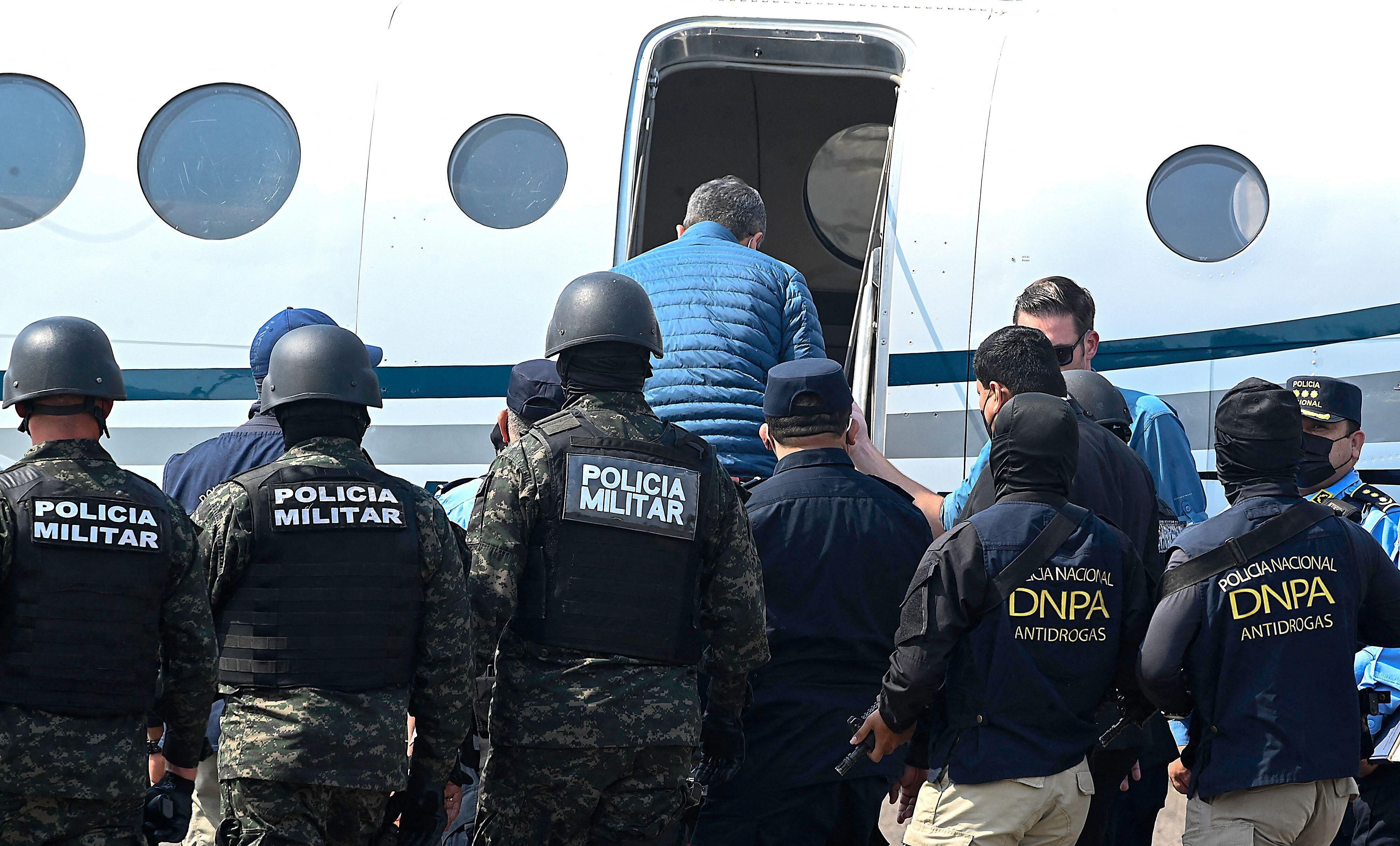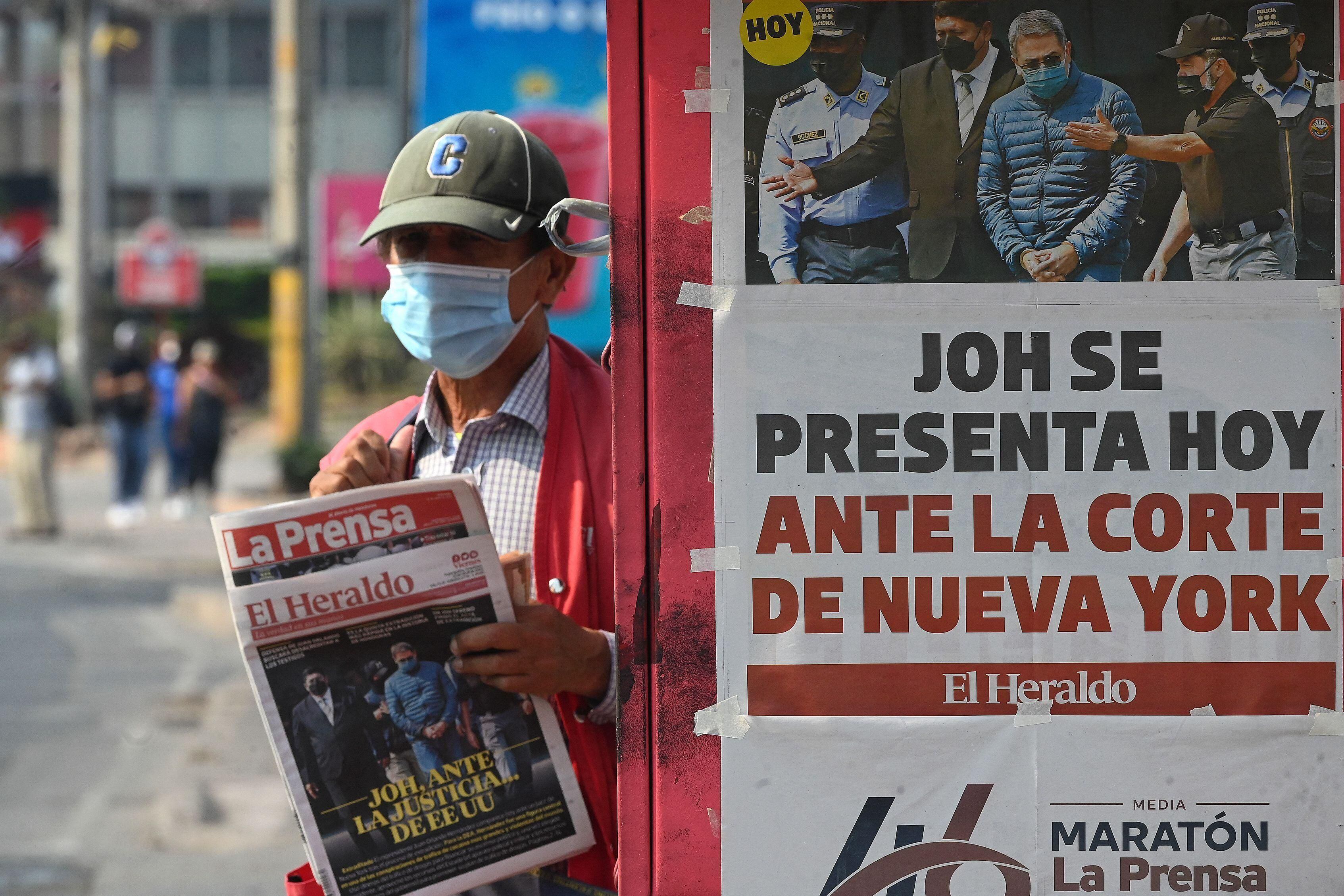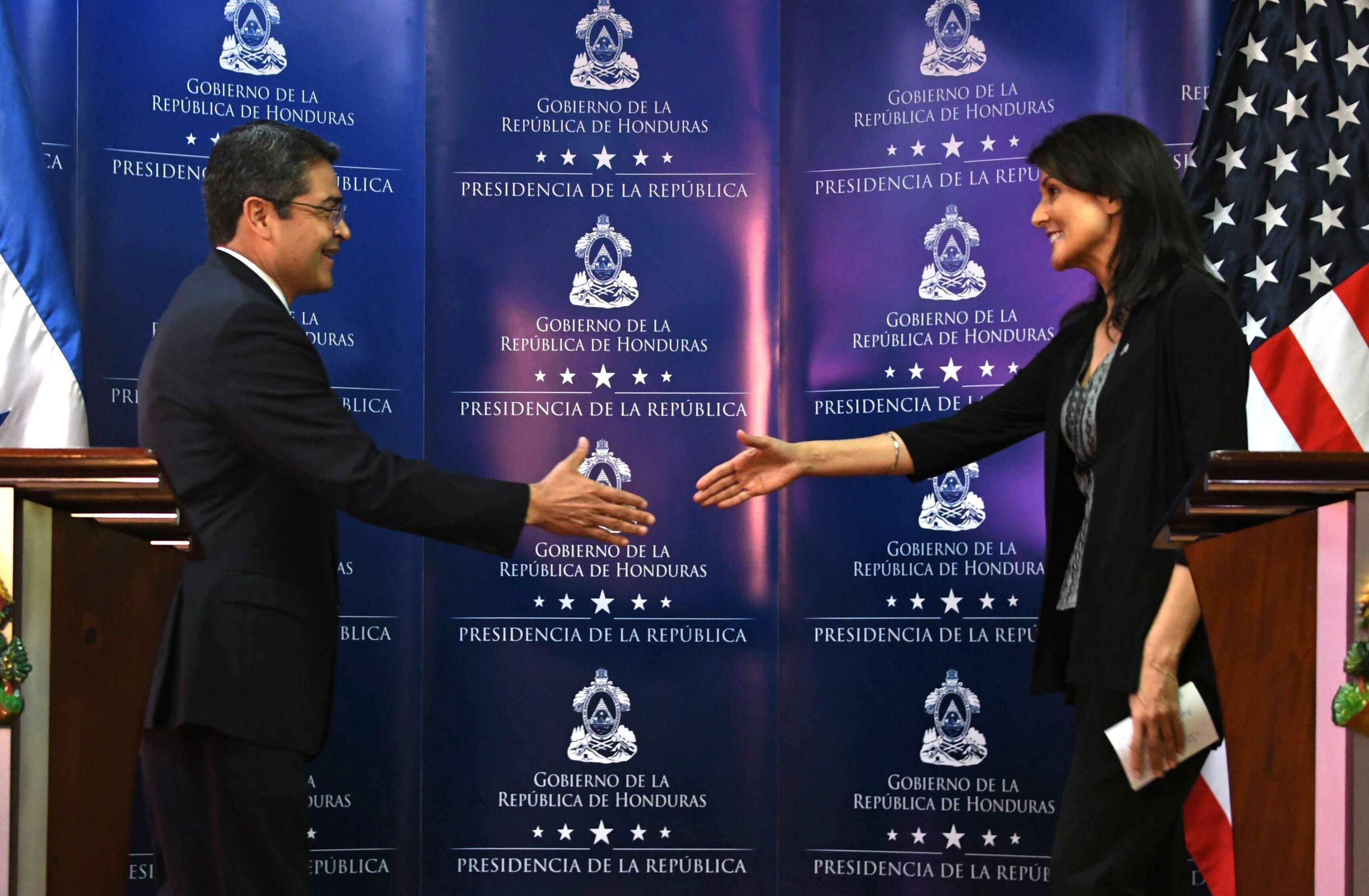In the vast history of trials of Latin Americans for drug trafficking in the United States, which begins this Tuesday against the former Honduran president, Juan Orlando Hernandezoccupies a special place.
Hernández was arrested at his home in Tegucigalpa in February 2022, just 19 days after leaving power, and extradited to the United States in April of that year to face drug trafficking charges in a New York court that he rejects.
LOOK: Satellite images that reveal “the works” that Egypt is carrying out on its border with Gaza
The trial is eagerly followed in Honduras, where some media have called it “the trial of the century”, and its start has been delayed for a number of reasons.
Although in the US there have been other recent high-profile trials for drug trafficking – such as the one held last year against the former Mexican Secretary of Public Security, Genaro García Luna, or in 2019 against the leader of the Sinaloa cartel, Joaquín “El Chapo” Guzmán – It is extraordinary that a former head of state like Hernández is accused of such crimes in the north of the country.
The most notable precedent is that of the late Panamanian general Manuel Antonio Noriega, sentenced to 40 years in prison in 1992 in Miami.
“These are the types of connections that are most difficult to achieve, but also for which there is more impunity precisely due to the levels and political interests that move”, explains Angélica Durán-Martínez, science teacher, to BBC Mundo. … politician from the University of Massachusetts Lowell, expert on drug trafficking and crime.
There are four keys that help to understand the dimension of JOH’s trial, initials by which the former Honduran president is also known:
1. Who is it
Hernández, 55, governed Honduras between 2014 and 2022 for two consecutive terms, despite the country’s Constitution prohibiting presidential re-election.
He came to office as a candidate for the conservative National Party of Honduras, after presiding over the National Congress and the political crisis that erupted in 2009, when then-president Manuel Zelaya tried to hold a non-binding referendum to change the Constitution and was deposed.
Although Zelaya was seen as an ally of then-Venezuelan president Hugo Chávez, a socialist at odds with the US, Hernández showed himself to be Washington’s ally on security and migration issues since he came to government.
A decision by the Supreme Constitutional Court, with a pro-government majority, authorized JOH to seek a second term in the 2017 elections, which were controversial.
The president gained an advantage in the vote after several irregularities highlighted by international observers and, when he was declared the winner, massive protests broke out that left several people dead.
The Organization of American States (OAS) called for a repeat of the elections, but the US, under the presidency of Donald Trump, accepted Hernández’s re-election.
At the same time that his government received economic aid from Washington, JOH signed a controversial pact with Trump to stop the flow of migrants to the US.
In 2020, Hernández avoided renewing the mandate of an anti-corruption mission created in Honduras with support from the US and the OAS, which had helped investigate dozens of Honduran officials.
But by then, US security forces and prosecutors had already discreetly targeted the Honduran president.
2. What they accuse you of
On the same day April 21, 2022 that JOH was extradited on a US drug agency DEA plane, a New York federal court revealed charges against him for drug trafficking and weapons possession.
The U.S. Department of Justice stated that Hernández “engaged in a corrupt and violent drug trafficking conspiracy to facilitate the importation of hundreds of thousands of kilograms of cocaine into the United States.”

He added that while he was congressman and president, JOH allegedly received “millions of dollars in cocaine profits that he used to enrich himself, finance his political campaigns and commit electoral fraud while the people of Honduras endured conditions of poverty and excessive violence. ”
And he specified that Hernández allegedly used his position to protect drug shipments passing through his country with Honduran security forces to the USA, supporting local drug trafficking organizations in Mexico and other countries.
In particular, he noted that during his 2013 presidential campaign he accepted a $1 million bribe from “El Chapo” Guzmán, which was collected by his brother Tony Hernández and an associate armed with machine guns, to protect the activities of the Sinaloa cartel. in Honduras.
The former president was charged with three counts of conspiracy to import cocaine into the United States and use of machine guns and destructive devices for that purpose, which carry mandatory minimum sentences of 10 and 30 years to life in prison.
3. The tests
While the totality of the evidence U.S. prosecutors have against Hernández is unknown, witnesses and material evidence are expected to be presented in the lower Manhattan courtroom.
Some possible evidence emerged in previous trials, such as those carried out against his brother Tony Hernández, who was a Honduran deputy before being arrested in Miami, or Geovanny Fuentes Ramírez. Both were sentenced to life in prison by Judge Kevin Castel, the same person who is now leading the trial against the former president.
One of the witnesses in the Fuentes case was a former accountant at a Honduran rice factory who said he saw how JOH received briefcases with money from drug traffickers, with whom he sought partnership in a cocaine laboratory.

“We’ll shove drugs under their own noses and they won’t notice.”JOH would have said as reported by that accountant as a protected witness in the Fuentes trial.
People serving sentences for drug trafficking in the US, in an attempt to reduce their own sentences, are expected to testify against the former president, such as Devis Leonel Rivera, former leader of the Honduran drug group Los Cachiros, who claimed to have paid $250,000 to Hernández to protect him
Other possible witnesses are Fabio Lobo, son of former Honduran president Porfirio Lobo (2010-2014) and sentenced to 24 years in prison in the USA for drug trafficking, or Alexander Ardón, former Honduran mayor who is awaiting his own trial and who in Tony Hernández said he saw “El Chapo” bribe JOH.
One unknown is whether the former director of the Honduran police, Juan Carlos “El Tigre” Bonilla, and Mauricio Hernández Pineda, cousin of the former president and former police officer, who were co-defendants in the case against JOH and pleaded guilty , will also testify.
Among the material evidence expected to be presented are some drug accounting books that belonged to a former Honduran drug dealer murdered in a prison in his country after the conviction of Tony Hernández, in which there are entries in his name and “JOH”.
Prosecutors will seek to demonstrate to jurors that the former president committed the crimes they attribute to him beyond any reasonable doubt.
4. The defense
Hernandez and his lawyers have already given some clues about the strategy that the defense could follow to try to prove the defendant’s innocence.
As testimonies emerged that compromised him in previous trials in the United States, JOH dismissed them as statements from drug traffickers who wanted to take revenge on him for persecuting them, in an attempt to reduce their own sentences.
“I reiterate to my nation, as well as to the entire world: I am innocent, I am a victim of revenge and conspiracy by organized crime groups and political enemies,” Hernández said in a public letter released on Monday by his wife, Ana García.

He added that the accusations he faces “are false and unfair, full of lies, constructed in a fictional way based on the testimony of cooperating witnesses, all confessed drug traffickers with negotiation agreements with the Public Prosecutor’s Office”.
The defense argues that during Hernández’s term, extraditions of Honduran drug traffickers to the United States began. and measures against money laundering, which would challenge the idea that the former president participated in the drug business.
In recent weeks, signs have emerged that Hernández will seek to cite in his defense communications or meetings he had as president with US officials or agencies to collaborate on security issues.
The Public Prosecutor’s Office opposed the use of this information on the grounds that it is confidential, of little relevance to the trial and its disclosure could compromise security.
Judge Castel is in charge of resolving these differences and has already held previous hearings with the parties to determine the limits.
In any case, Hernández’s defense anticipated that the former president intends to testify at his own trial to refute the accusations, something atypical in these cases.
Behind all this a question arises: why did Washington maintain fluid ties with Hernández even when its security agencies were collecting evidence against him?
“Generally, the presumption is that they did not know and the truth is that there is always evidence that there were indications and that US security agencies are aware to a certain level of their contacts”, says Durán-Martínez.
And he highlights that Hernández’s case has similarities with those of the Mexican García Luna or the former Peruvian presidential advisor Vladimiro Montesinos, in addition to Noriega himself, who were seen as allies of the United States in the fight against drug trafficking before falling into disgrace.
“The war on drugs was defined around presenting short-term results,” says the expert, “so it is still advantageous for the United States, in some cases, to tolerate these characters if they can continue to show some results in the fight against the drugs”. or other political elements.”
Source: Elcomercio
I am Jack Morton and I work in 24 News Recorder. I mostly cover world news and I have also authored 24 news recorder. I find this work highly interesting and it allows me to keep up with current events happening around the world.

:quality(75)/cloudfront-us-east-1.images.arcpublishing.com/elcomercio/SUQEXDAX3BALNAD72DMV7XKFN4.jpg)

:quality(75)/cloudfront-us-east-1.images.arcpublishing.com/elcomercio/5654RWXEZNAHBAUQGSA5AMCBPI.jpg)
:quality(75)/cloudfront-us-east-1.images.arcpublishing.com/elcomercio/PSQLPOYOV5C73HS3JKYTECFHMU.jpg)
:quality(75)/cloudfront-us-east-1.images.arcpublishing.com/elcomercio/SVHYTIAJDZGOROSJSNQ4DDW5JA.jpg)
:quality(75)/cloudfront-us-east-1.images.arcpublishing.com/elcomercio/FTGVKAAYQNCIBBJYPI6PKBTWUA.jpg)
